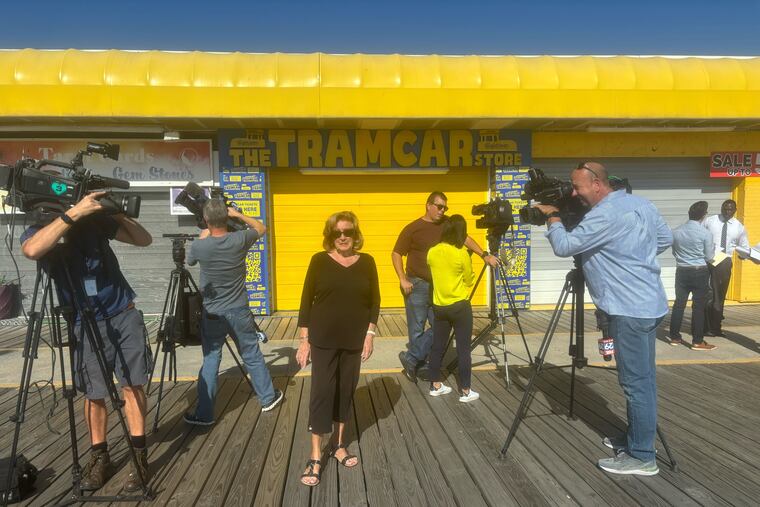The woman who recorded Wildwood’s ‘Watch the tram car, please’ 50 years ago is suing the city
Floss Stingel, whose voice has defined the Wildwoods for decades, says she's never gotten paid.

NORTH WILDWOOD — Floss Stingel wants to get paid, please.
Stingel, now in her 80s, recorded the words “Watch the tram car, please” into a tape recorder in 1971 as a favor to her boyfriend and — even as her voice and those words grew to become legendary, iconic, epic, synonymous with Wildwood, all those things — she never once received any money.
“I just spoke into a recorder, and it’s been used ever since,” she said Tuesday on the North Wildwood boardwalk, where she’d come to announce a lawsuit.
When stores started selling tram car plush dolls with her voice recording the summer before last, Stingel said, she had finally had enough.
So now, five decades later, Stingel is suing the City of Wildwood, the Wildwood Business Improvement District, the Wildwoods Boardwalk Special Improvement District, Wildwood Historical Society and the George F. Boyer Museum, Morey’s Piers & Beachfront Waterparks, and St. George’s Stores.
She is also asking that Wildwood be barred from any further use of her voice “without proper authorization and compensation.”
On the boardwalk Tuesday, she and her attorney, Emeka Igwe, met reporters outside the Tram Car Store in North Wildwood to discuss her lawsuit. With the tram cars not running in the offseason, Stingel, generously, did several live renditions of the words for the cameras.
She said she’s resigned to Wildwood and the others changing the message as a result of the lawsuit (though Igwe pointed out that an April Fool’s announcement one time that they would do so brought an outcry).
“I’m sure they’re going to be upset with this and probably not use my voice again,” Stingel said.
“Our goal is to allow the voice to continue,” Igwe said.
Paid in tickets
The lawsuit, filed this week in Superior Court in New Jersey, alleges “unauthorized use and monetization of Floss Stingel’s voice pursuant to common law,” by “using a recording of her voice for over 45 years without compensation.”
“She’s the iconic voice of Wildwood for over 50 years,” Igwe said. “Unfortunately, even though defendants in this lawsuit, including the city of Wildwood, have benefited financially for using her voice for commercial purposes, she has not been paid a single penny for this.
“All she’s received are tram car tickets, which she usually gives away,” he added. New Jersey law calls for compensation if your likeness is used for commercial purposes, he said.
In 2007, Stingel tried to get copyright protection for the recording, but was rejected because the recording took place before the laws changed, Igwe said.
“We’re just asking for what’s fair,” Igwe said. “She’s a lifelong resident of Wildwood, New Jersey, she still lives in the same apartment for well over 30 years. We are asking the defendants to do the right thing.”
Stingel said she has felt mostly pride about hearing her voice constantly over the last five decades, but frustrated over the lack of compensation. She said when the wind is blowing a certain way, she can even hear the voice in her apartment.
Stingel’s lawsuit doesn’t specify an amount that she is seeking, but it notes that the tram car’s message has been played continuously for decades, about 6,000 times a day in the summer, and is one of the most recognized and imitated slogans in the Philadelphia area, if not the world. It’s been heard on an episode of Sex and the City, though the episode took place in Atlantic City..
Out on the boardwalk, public opinion was split.
“Now all of a sudden, she wants to make money,” said Daniel Rollick, riding a motorcycle past the gathering. “She’s not going to get a dime.”
But Bob Ervin posed for a photo with Stingel and said she had his support. “My kids are always imitating you,” he said. “I hope they don’t change the voice.”
A Wildwood fixture
The lawsuit notes that the fare was $4 in 2022 and increased to $5 in 2023. “Therefore, the tram cars are expected to make $2.5 million per year,” the lawsuit states.
“Every time an operator of the Wildwood Tram Car presses a button to warn pedestrians of the tramcar, Ms. Stingel’s voice recording plays,” the lawsuit notes. “Her voice can be heard on the boardwalk by people passing by and by locals living in the area when the wind blows her voice their way.”
The lawsuit also notes that Stingel has been invited to numerous public relations and revenue-generating events to promote the city and the tram cars, including during the 60th birthday celebration of the tram cars, where Ms. Stingel “ended the ceremony with a live version of her famous slogan.” She was also invited in 2007, when replicas of the tram cars were introduced.
“Ms. Stingel’s voice recording has been used in television documentaries about the Wildwoods and to make and sell memorabilia — including T-shirts, toy tramcars, brochures, and postcards — which is also used to attract tourists and bring in revenue for Defendants,” the lawsuit states.
In 1971, Stingel’s boyfriend worked for the Ramagosa family, which in 1949 had purchased the historic electric-powered tram cars that debuted at the 1939 New York City World’s Fair. The tram cars are “some of the oldest operating modes of transportation in the United States,” the lawsuit notes.
Her boyfriend had asked her to create the recording “to provide a warning that the tram cars could use.”
At the time, Stingel “had experience performing commercial voice recordings for her then-employer, South Jersey Gas Company,” the lawsuit states.
Wildwood, Morey’s, and the Historical Society, which sells talking tram car dolls, did not immediately respond to requests for comment.